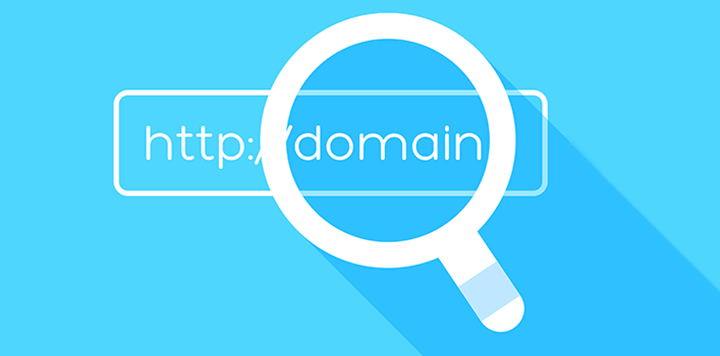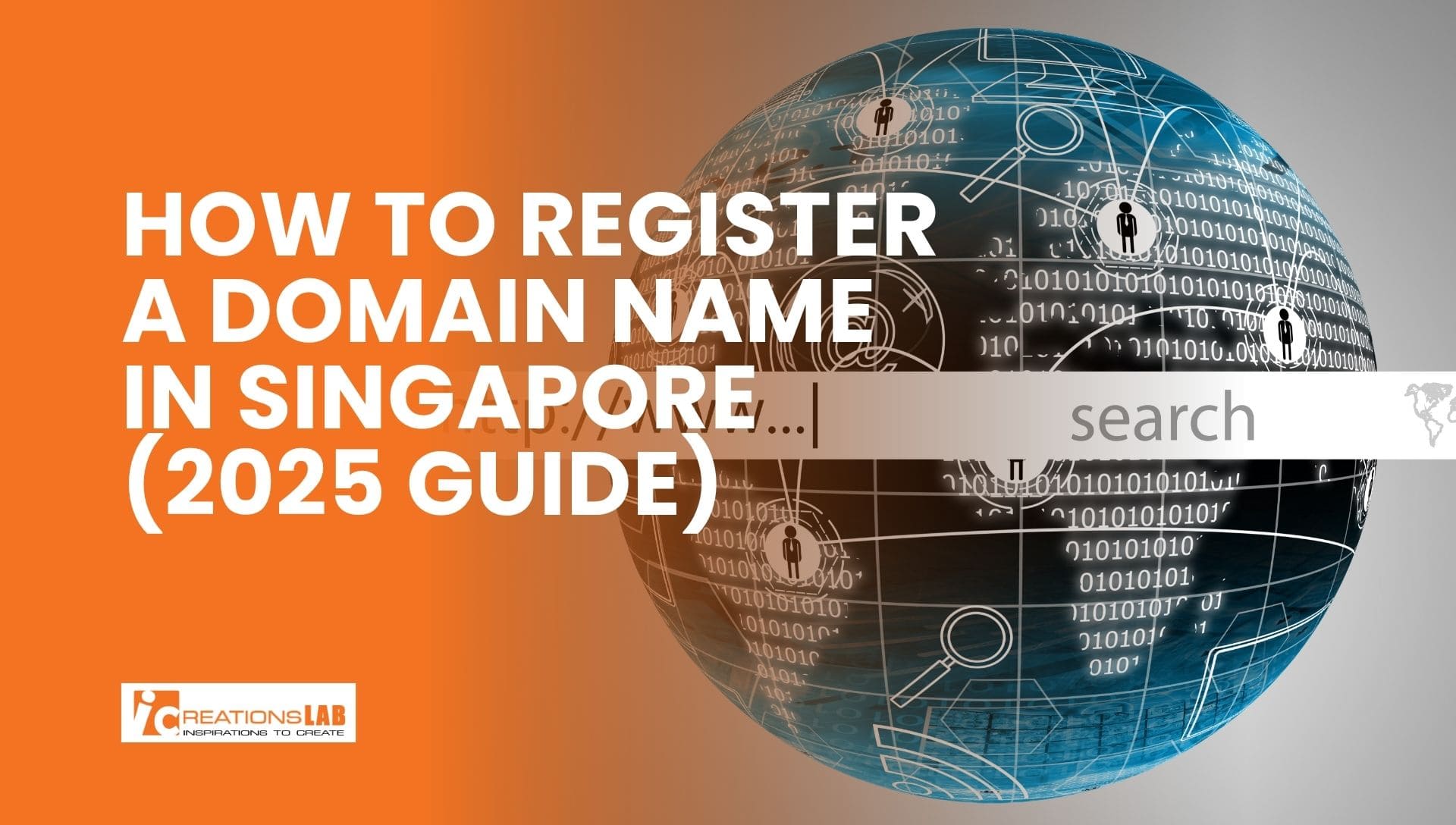Your domain name is your website’s digital identity — it’s how customers find you online, remember your brand, and connect with your business. In Singapore’s digital-first economy, owning a strong, credible domain name is the first step to building your online presence.
This comprehensive guide will walk you through everything you need to know about domain registration in Singapore, from choosing the right name to securing it with a trusted registrar. Whether you’re starting a small business or launching a new online venture, this article gives you all the information you need to get it right the first time.
1. What Is a Domain Name and Why It Matters

A domain name is the address people type into their browser to visit your website — for example, www.icreationslab.com. Think of it as your online home address.
When users type your domain into their browser, it connects them to your web server, which hosts your website content. Without a domain name, people would need to remember complex IP addresses (like 203.0.113.10). Domains make the internet human-friendly.
Why Your Domain Name Is Important
- Brand identity: It reflects your company’s name, values, and credibility.
- Trust and professionalism: Customers trust businesses with their own domain (e.g. yourbrand.sg) more than a free subdomain.
- SEO advantages: A domain that matches your business or target keyword can help Google understand your niche.
- Memorability: Short, clear domains are easier to recall and share.
- Email identity: You can create custom email addresses (e.g. [email protected]) that look professional and consistent.
See More: 7 Common Web Page Design Mistakes That Drive Visitors Away
2. Understanding Domain Extensions (.com, .sg, etc.)
When registering a domain, you’ll choose a domain extension (also known as a Top-Level Domain or TLD). The TLD follows your domain name — such as .com, .sg, .net, or .org.
Popular Domain Extensions in Singapore
| Extension | Meaning | Ideal For |
| .com | Commercial | Global businesses |
| .sg | Singapore | Local businesses and organisations |
| .com.sg | Commercial Singapore | Registered companies in Singapore |
| .org.sg | Non-profits | Organisations and charities |
| .edu.sg | Education | Schools and universities |
| .gov.sg | Government | Government entities |
Which One Should You Choose?
If your business targets Singapore customers, .sg or .com.sg instantly builds local trust. A .com extension, on the other hand, gives your business international appeal.
Pro tip: Many companies register both .com and .com.sg to protect their brand from competitors or impersonators.
3. Step-by-Step: How to Register a Domain Name in Singapore
Here’s a simple, step-by-step process to help you register your domain successfully.
Step 1: Brainstorm and Choose Your Domain Name
Your domain name should:
- Match your business name or key product
- Be easy to spell and pronounce
- Avoid hyphens, numbers, or slang
- Reflect your brand personality
Use free tools like NameMesh, LeanDomainSearch, or Google Domains to generate ideas.
Example:
- Brand: iCreationsLab
- Possible domains: icreationslab.sg, icreationslab.com, iclab.sg
Step 2: Check Availability
Visit a domain registrar like:
- Exabytes (exabytes.sg)
- Vodien (vodien.com)
- SingNet (singnet.com.sg)
- GoDaddy (godaddy.com)
- Namecheap (namecheap.com)
Enter your desired domain to check if it’s available. If not, try slight variations (like adding “official”, “group”, or “sg”).
Step 3: Choose a Reputable Domain Registrar
A domain registrar is a company accredited to sell domain names. Choose one that offers:
- Accreditation by SGNIC (Singapore Network Information Centre)
- Transparent pricing (no hidden renewal fees)
- DNS and WHOIS management tools
- Reliable support
- Domain privacy protection
Recommended SGNIC-accredited Registrars:
- Exabytes Network (Singapore) Pte Ltd
- Cybersite Services Pte Ltd
- Vodien Internet Solutions
- IP Mirror (by CSC Digital Brand Services)
Step 4: Register Your Domain
Once you’ve chosen your registrar:
- Add your chosen domain to cart.
- Provide your contact information (individual or company).
- Verify your details — some .sg domains require Singaporean citizenship or business registration (ACRA).
- Choose your registration term (1 to 10 years).
- Make payment (usually via credit card or PayNow).
You’ll receive an email confirmation once registration is successful.
Step 5: Verify and Activate Your Domain
Check your registrar’s dashboard — your new domain should now appear under your account.
To activate it for your website:
- Connect it to your web hosting (by updating DNS or nameservers)
- Set up SSL certificate for secure HTTPS
- Configure email hosting if needed
Congratulations — your domain is now live!
See More: 10 Best Website Design & Development Companies 2025
4. How Much Does It Cost to Register a Domain in Singapore?

The cost depends on your chosen extension and registrar. Here’s a price guide (as of 2026):
| Extension | Average 1-Year Cost | Renewal | Notes |
| .com | S$15 – S$25 | S$18 – S$28 | Most popular |
| .sg | S$35 – S$50 | S$35 – S$55 | Requires local presence |
| .com.sg | S$45 – S$60 | S$45 – S$65 | For registered companies |
| .org.sg | S$30 – S$45 | S$30 – S$50 | For non-profits |
Extra Costs
- Domain privacy (S$5–S$15/year)
- DNS management tools
- Email or web hosting (optional)
Tip: Many registrars offer free domain registration for 1 year when you purchase a hosting package.
5. Legal Requirements for .SG Domain Registration
The .sg domain is managed by SGNIC (Singapore Network Information Centre). Certain restrictions apply:
| Type | Requirements |
| .sg | Singapore citizen, PR, or company with local address |
| .com.sg | Registered business in Singapore (ACRA number required) |
| .org.sg | Registered society or non-profit organisation |
| .edu.sg | Ministry of Education approval |
| .gov.sg | Government agency only |
Verification Process
After registration, you may be asked to submit supporting documents:
- Individuals: NRIC or FIN copy
- Companies: ACRA Business Profile
Failure to verify within the given time may result in suspension.
See More: Best Website Builders Compared: Which One Fits Your Business?
6. Choosing the Right Domain Name for SEO
Your domain can influence your website’s Google ranking and brand visibility.
SEO Tips for Choosing a Domain
- Keep it short: Under 15 characters if possible.
- Include keywords naturally: e.g. singaporewebdesign.sg.
- Avoid hyphens and numbers: They’re harder to remember.
- Use local relevance: .sg tells Google you serve Singapore users.
- Register similar variations: Prevent brand hijacking.
Example:
✅ yourbrand.sg
✅ yourbrand.com.sg
❌ your-brand-123.sg
7. Domain Privacy, Security, and Ownership
Domain Privacy Protection
When you register a domain, your personal details (name, email, phone) appear in the public WHOIS database.
To protect your privacy, enable Domain Privacy or WHOIS Guard (offered by most registrars).
Domain Security Best Practices
- Enable 2FA (Two-Factor Authentication) on your registrar account.
- Lock your domain to prevent unauthorized transfers.
- Renew your domain early to avoid accidental expiration.
- Keep your contact information up to date.
Ownership
Always ensure the domain is registered under your name or company, not a third-party web designer. This gives you full control.
See More: Custom UI UX Design Solutions for Businesses in 2025
8. Linking Your Domain to Web Hosting
After you’ve successfully registered your domain name, the next crucial step is to connect it to your web hosting account. This process allows visitors who type in your domain (e.g. www.yourbrand.sg) to reach your website content stored on your hosting server.
Why Linking Matters
A domain name alone doesn’t make your website visible — it’s simply an address. The actual files, images, and code live on your web hosting server. Linking your domain tells browsers where to find your website data.
Step-by-Step: Connecting Your Domain to Hosting
- Log in to your domain registrar’s dashboard
- Find the domain you’ve registered.
- Look for a section named “DNS Settings” or “Nameserver Management.”
- Locate the nameserver (DNS) settings
- DNS (Domain Name System) translates your domain name into the IP address of your hosting server.
- Replace the default nameservers with your hosting provider’s nameservers
Example:
ns1.hostingprovider.com
ns2.hostingprovider.com
These values are provided by your hosting company (e.g. Exabytes, Vodien, SiteGround, or Bluehost).
- Save the changes
- DNS changes usually take 24–48 hours to fully propagate worldwide.
- During this time, some users may still see the old site or an inactive page — this is normal.
- Verify your connection
- Use tools like dnschecker.org to confirm your DNS records have updated.
- Once successful, visiting your domain should load your hosted website.
Pro Tips
- Always double-check spelling in your nameservers — a single typo can break your website connection.
- If you’re unsure, ask your web design or IT provider to configure DNS for you.
- Consider using Cloudflare DNS for faster performance and extra security (DDoS protection and SSL).
See More: How Custom Web Development Services Can Skyrocket Your Sales
9. Renewing and Managing Your Domain Name
A domain is not a one-time purchase — it’s more like a subscription that you must renew periodically. Most domains are registered for 1 to 10 years.
If your domain expires, your website and email addresses associated with that domain will stop working — which can hurt your SEO and brand credibility.
Why Domain Renewal Matters
Losing your domain can cause:
- SEO loss: Search rankings and backlinks built over years may disappear.
- Email disruption: Your business emails (like [email protected]) will fail.
- Brand risk: Expired domains can be bought by competitors or spammers.
How to Manage Domain Renewals Effectively
- Enable Auto-Renewal
Most registrars allow you to turn on automatic renewal to ensure continuous ownership. - Register for Longer Terms (3–5 years)
Long-term registration not only provides peace of mind but can also signal stability to search engines. - Monitor Renewal Dates
- Set reminders 30 days before expiration.
- Use your registrar’s dashboard or sync with Google Calendar.
- Keep Your Contact Info Updated
Ensure your email address in your registrar account is valid — renewal reminders are sent there. - Renew Before Expiry Grace Period Ends
After expiration, you may get a 30-day grace period. Once it enters the redemption phase, recovering the domain could cost hundreds of dollars.
Pro Tip
Registering your domain for multiple years can enhance both SEO continuity and brand security, especially for established businesses.
10. Common Mistakes to Avoid When Registering a Domain
Even tech-savvy entrepreneurs can make critical mistakes when registering their domain. Avoiding these pitfalls can save you from headaches, financial losses, and SEO damage.
1, Choosing a Confusing or Overly Long Name
A long or complex domain is hard to remember and prone to typing errors.
Do this: Keep it short (under 15 characters) and easy to pronounce.
Avoid: Numbers, hyphens, or mixed capitalization (e.g., my-awesome-company123.sg).
2, Not Checking Trademark or Business Name Availability
Before buying a domain, always check with:
- ACRA (Accounting and Corporate Regulatory Authority) – to ensure your business name isn’t already taken.
- IPOS (Intellectual Property Office of Singapore) – to avoid trademark infringement.
Failing to do this can result in legal disputes or forced domain surrender.
3, Ignoring Renewal Deadlines
One of the most common and costly errors.
Enable auto-renew and add calendar alerts so you never lose ownership.
4, Letting Someone Else Register Your Domain
Some businesses let web designers or agencies register domains on their behalf.
Always ensure the registrant (legal owner) is you or your company, not a third party.
If someone else controls your domain, you risk losing it if the relationship ends.
5, Buying from Unaccredited or Suspicious Registrars
Stick to SGNIC-accredited registrars like Exabytes, Vodien, or Cybersite.
Unaccredited sites might sell subdomains or use deceptive pricing.
See More: Professional Custom Web Development Services for Businesses in 2025
11. Future Trends in Domain Registration (2026 and Beyond)
As the internet evolves, domain registration continues to transform. Here are the emerging trends shaping the future of online identities in Singapore:
AI-Driven Domain Suggestions
Modern registrars use AI-powered tools to analyse keywords, availability, and market trends — offering creative domain ideas that align with SEO and branding goals.
Blockchain-Based Domains
Domains like .crypto, .eth, or .web3 are registered on blockchain networks, giving owners full control without central authority.
Although still emerging, blockchain domains could revolutionise digital ownership.
Geo-Targeted Domains for Local SEO
Country-specific extensions like .sg and .com.sg remain powerful for local rankings.
Google prioritises local domains in Singapore-based searches, making them essential for businesses targeting local customers.
Bundled Services
Registrars now offer all-in-one packages — domain, hosting, email, and SSL — simplifying setup and management.
Stronger Domain Security
With rising cyber threats, advanced multi-layer DNS protection, two-factor authentication, and auto-renew systems are becoming the new standard.
See More: How Much Does Web Page Design Cost in Singapore?
12. Best Domain Registrars in Singapore (2026 Edition)
Choosing the right registrar ensures a smooth registration process and reliable support. Here are some of the top domain registrars in Singapore for 2026:
| Registrar | SGNIC Accredited | Starting Price (S$) | Key Features |
| Exabytes.sg | ✅ | 14.99 | All-in-one packages with hosting, email & SSL |
| Vodien.com | ✅ | 18.00 | Enterprise-grade DNS & 24/7 local support |
| Cybersite.sg | ✅ | 22.00 | Secure business management & fast DNS |
| GoDaddy.com | ❌ | 12.00 | Global reach, user-friendly dashboard |
| Namecheap.com | ❌ | 14.00 | Free WHOIS privacy & strong global presence |
Local vs Global Registrars
- Local registrars (Exabytes, Vodien, Cybersite): Offer SGNIC compliance, PayNow payment, and local customer support.
- Global registrars (GoDaddy, Namecheap): Often cheaper but may not support .sg domains or local verification.
Tip: Always check renewal rates — some registrars advertise low first-year prices but higher renewals later.
13. Should You Register Multiple Domains?
Yes, and here’s why: owning multiple domain variations protects your brand from misuse and strengthens your online presence.
Why You Should Own Multiple Domains
- Brand Protection: Prevent competitors or copycats from using similar names.
- SEO Consistency: Redirecting all versions to one main site consolidates search authority.
- Market Expansion: Use different domains for regional targeting or new product lines.
- Error Prevention: Capture traffic from common misspellings.
Examples of Domain Variations
- yourbrand.com
- yourbrand.sg
- yourbrand.com.sg
- yourbrand.net
- yourbrnd.sg (common misspelling)
Use 301 redirects to point all versions to your main website (e.g. www.yourbrand.sg).
This ensures visitors and search engines always land on your official page.
Pro Tip
If your brand name is unique, secure it early — domains are first-come, first-served. Once it’s taken, reclaiming it may be impossible or costly.
See More: Fast & Affordable Website Creation Singapore Services in 2025
14. Domain Name vs Web Hosting vs Website Builder
Many beginners confuse these three components, but each plays a distinct role in building a website.
| Element | Description | Example |
| Domain Name | Your website’s unique address | www.icreationslab.com |
| Web Hosting | The online server that stores your site files | Exabytes, Vodien |
| Website Builder | The software to design and manage your site | WordPress, Wix, Webflow |
To launch a website, you need all three working together:
- The domain points users to your site.
- The hosting stores your content.
- The builder or CMS lets you design and update pages.
Pro Tip
If you’re new, choose an integrated solution — a web design agency (like iCreationsLab) can handle domain registration, hosting setup, and design in one seamless process.
15. How iCreationsLab Can Help You Get Started
At iCreationsLab, we’ve been empowering Singaporean businesses to build strong digital identities since 2008.
We understand that choosing and managing a domain is more than a technical step — it’s the foundation of your online brand.
Our Domain & Web Solutions Include:
- Domain name registration & management (.com, .sg, .com.sg, etc.)
- Professional web hosting setup & SSL configuration
- Custom email setup for professional communication
- SEO-optimised web design tailored to your brand
- Website maintenance, performance, and security support
Why Choose iCreationsLab
- Local expertise: We’re based in Singapore and understand SGNIC policies and business needs.
- Full-service solutions: From domain to design, we handle everything end-to-end.
- Proven experience: Trusted by hundreds of SMEs and enterprises across multiple industries.
- Ongoing support: Reliable local support whenever you need it.
Start your journey today.
Let iCreationsLab help you register your domain name, set up your hosting, and launch a professional website that represents your brand with confidence.

